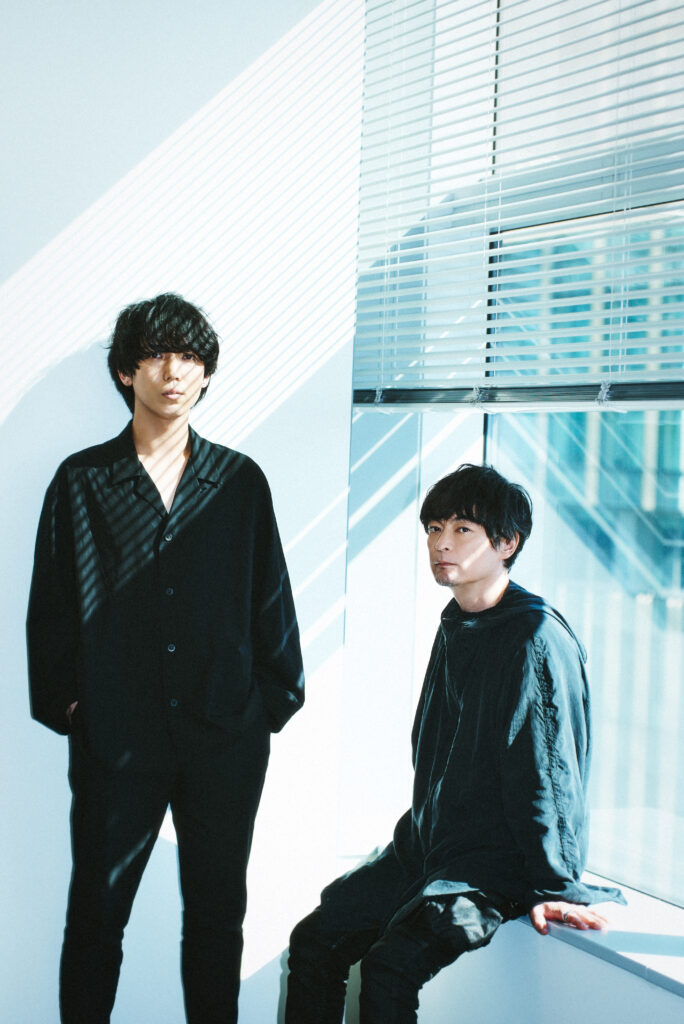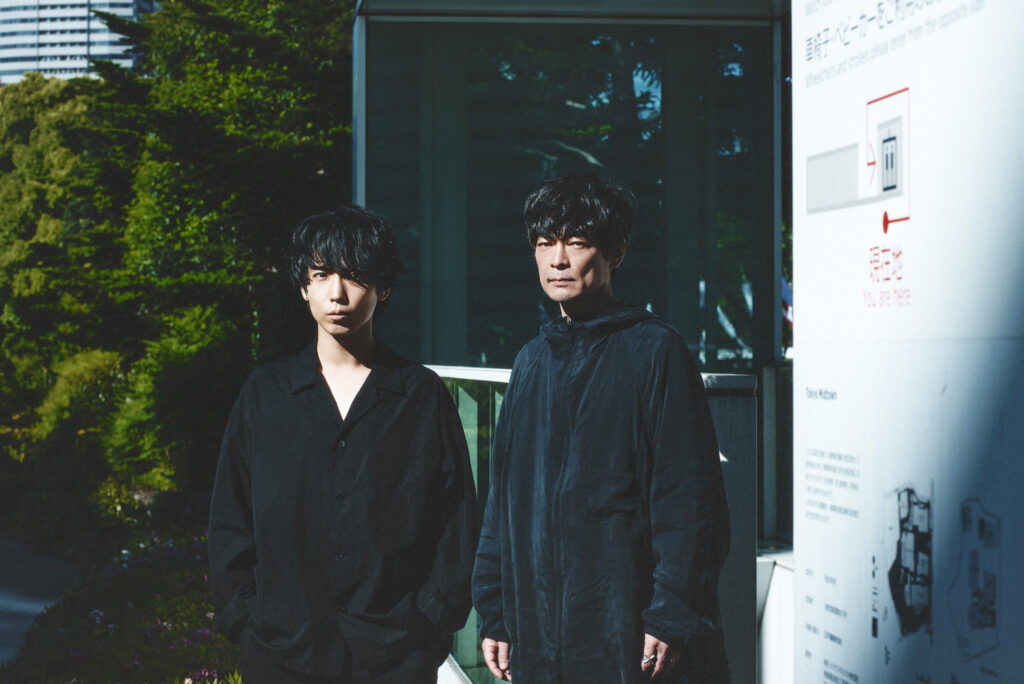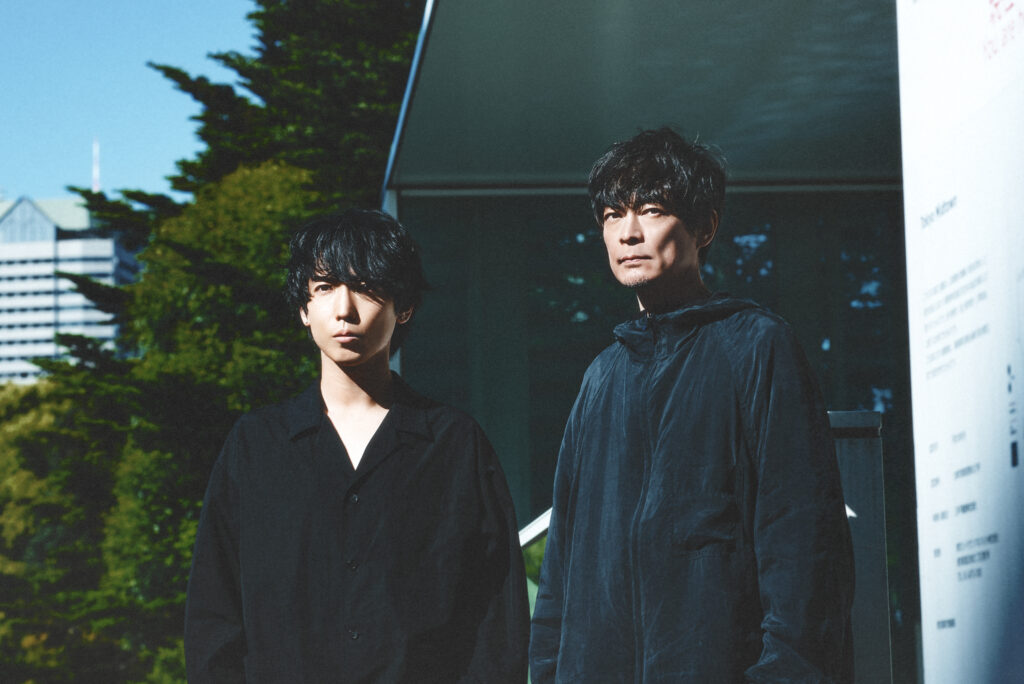“We’re called The Spellbound. We’re going to give you a wonderful music experience. Thank you!” A new band, The Spellbound, made this statement on December 15th. It comprises Masayuki Nakano from Boom Boom Satellites and Yusuke Kobayashi from The Novembers. They put in the effort to release singles online for five months: Hajimari, released on January 13th, Nanimokamo, Namae wo Yonde, A DANCER ON THE PAINTED DESERT, and FLOWER, their newest single out on May 26th. The pure sounds created by two unique and talented minds are apparent. The brightness of their upbeat and timeless sound and their determination to breathe new life into the sounds themselves are evident too. Nakano and Kobayashi speak about how they cultivated faith in themselves as a band, which started with Nakano looking for a vocalist and appointing Kobayashi.
——Nakano-san, you started this off by asking people to apply to become a vocalist, right? What vision did you have in terms of your new musical direction?
Masayuki Nakano (Nakano): I didn’t have a specific idea. It began with me tweeting in the spur of the moment. I felt antsy to do something new. Kobayashi-kun contacted me straight away—about five seconds later—like, “Please consider me as a candidate” (laughs).
Yusuke Kobayashi (Kobayashi): I felt compelled to do it, and although this isn’t a cool thing to say, I didn’t want anybody else to do it. I took action using only my emotions like, “I’m going to contact him now!”
——Did you know each other before then?
Kobayashi: Yes. I think we first met at some festival? Then, I went to Boom Boom Satellites’ live show and said hello to him in the green room.
Nakano: I’ve invited The Novembers as a guest on tour before. We had dinner a few times after that. But when I made an open call for a vocalist, we hadn’t seen each other for a while. We weren’t in touch then; we didn’t see each other regularly. I was a bit surprised when he said, “Please consider me as a candidate.” It wasn’t like I had chosen the winner beforehand.
Kobayashi: I was seriously serious (laughs).
Nakano: I tweeted in hopes of connecting with someone good. Maybe I wouldn’t have met up with Kobayashi-kun organically. Perhaps it was better than contacting him like, “Kobayashi-kun, let’s do something.”
——From that point onwards, how did you make music together?
Nakano: We were trying things as we went at the beginning. We first met up and talked about doing something. Kobayashi-kun started coming over once a week. I have a small studio at home, so we would spend time making music together and talking a lot. But we couldn’t make a good song, which I hadn’t expected. I rarely have a negative image towards The Novembers’ music. I can easily accept good music as it is; I’m one of the few Japanese artists who does that. Despite that fact, we spent a long time making songs that made me think, “Why doesn’t this equation add up? If two talented artists come together, the [music] shouldn’t be this bad.”
——That’s unexpected.
Nakano: I went back and forth in my head forever. I was like, “Should I quit? Maybe we don’t match.” Perhaps we were holding back because we couldn’t create synergy. But we didn’t give up. As we continued meeting once a week, we came up with a song that made me feel, “This is the one!” That was the first time we found our standards, like “Yeah, this is it.” There was a moment where I thought, “If we could make this, we could make an even better one.” I think it took about a year to get to that point.
――Kobayashi-san, in hindsight, what do you think about the phase before you two kicked The Spellbound into gear?
Kobayashi: I thought I was giving it my all every time. But back then, I didn’t open my heart enough and take the process seriously and genuinely. I wasn’t able to open my heart to the music we were making, Nakano-san, and myself. It was valuable to go through a slump or a period where I thought, “Why isn’t it going well?” to come to this realization. For instance, even if someone else were to tell me things like “You’re just not opening your heart” and “You need to take this more seriously,” over and over, I wouldn’t understand it, even if I know it. When we made our song, Nanimokamo, I discovered a clue, like “I got it!” When I found that clue, I felt like we manifested a poignant song. Today, I feel like that’s everything.
“Kobayashi-kun is an innocent person,”
“Nakano-san is like a Shinto priest”
——Nakano-san, how would you describe the appeal of Kobayashi-san as a vocalist and artist?
Nakano: Pure. Kobayashi-kun is an innocent person. There’s no darkness in his eyes. I don’t know if this is a good thing, but he’s an unselfish person. I often have to ask him if he wants to be well-liked by others; that’s how little he desires to be popular, understood, and liked. That’s how unfiltered he is. He’s like Michiyuki Kawashima, in that sense. He doesn’t act like a rockstar. I’m interested in art made by those who aren’t narcissistic at all. As we nurture The Spellbound together, we’re working on taking him to the next step as an artist. I mean, he’s an artist with a solid career and great music, but to me, he’s still an unpolished diamond. I hope his shine can move many people.
——What’s Nakano-san’s appeal, Kobayashi-san?
Kobayashi: There’s a lot, but the thing that makes me think, “Nakano-san is amazing,” the most is when he makes music. His movements shift to a believer of music, as though he’s handling something sacred. Music is something you can make right now with your hands, for better or worse. Other people might abruptly cut off a part or wrap things up at a decent stage, but he goes like, “What does this song want?” or “What is this song supposed to express?” His attitude, the way he uses his hands, his thinking—everything he does regarding every single sound is on another level. As I watched Nakano-san make music, I saw that he has his back straight. My attitude towards music—which I had thought was completely fine—was at best, casual and, at worst, sloppy.
Nakano: You think that highly of me (laughs)?
Kobayashi: I do. There are some sounds I can’t hear. Sometimes, when someone is mastering or editing the songs, I can’t tell the difference between the earlier and current sound. Professionals of any field have things only they can see, hear, and know. So, Nakano-san is like a Shinto priest. He hears god’s voice.
Nakano: Oh, I see. No one’s ever called me a Shinto priest before (laughs).
“When the music is good, it becomes a living thing”
——At the time of interviewing (April 26th), you’ve released three songs: Hajimari, Nanimokamo, and Namae wo Yonde. Did you come up with Nanimokamo first?
Nakano: We made all the songs around the same time, so there are many incomplete songs. We made those three songs at the same time. Nanimokamo was the first song that I wrote the lyrics to after it was polished and made me think, “This is it!” At first, it was like, “I tried to write the lyrics. Some parts and good, and others aren’t.” But the quality drastically improved when I wrote the lyrics like, “Don’t think too hard. Say what you want to say.” I then wrote words that made me think, “I can’t believe I came up with something this brilliant!” When Nanimokamo was complete, it gave me the strong impression that we had created a benchmark within ourselves.
——The combination of mixed genres and rock music is something that exists everywhere today. Rather than having a cutting edge sound, your music has a universal, luminous sound that people could listen to a decade or two from now. The fourth song, A DANCER ON THE PAINTED DESERT, gives me that feeling.
Nakano: My ideal of being a musician is to go beyond [different] eras. It would make the happiest if I could make something that people could regard as a good song, alongside a feeling of nostalgia, 10 or 20 years from now. Or something impactful that is well beyond the times, so much so that it makes people ask, “Which era is this music from?” Trends in beat music change rapidly. So even if you aim to be innovative a week from now, it might already be old two weeks later. Even if I were to compete in that genre, I don’t think I could win (laughs). I’ve experienced tough times like, “I might be the coolest today, but I’d be crap tomorrow.” Instead of [having] those sorts of values, I want to make music that would shine on forever. One of my goals is to create something that can’t be measured by values seen in mainstream music today.
Kobayashi: In contemporary music, I feel like there’s music that gets in bed with trends and music that can’t help but exist because the artist is living in the now and seriously confronting something. The latter is more universal. Regardless of the era, I don’t think human nature itself changes. I want to strive to make music that relates to others, in the sense that people ponder and live their lives in any era.
——Tomohiko Tsujimoto’s choreography in the music videos you’ve released until A DANCER ON THE PAINTED DESERT is impactful.
Nakano: We make music on our own, and we started the band during a time where it’s hard to play live. When we thought about how we could introduce ourselves, we felt that music videos would be crucial. So, we’re doing our best to make them (laughs). Tsujimoto-san consistently creates the choreography, and so I’m thankful because he’s shown a new side, feeling, and values to the music. It makes me go like, “Oh, I didn’t know he could interpret it that way.” He handled it at a high level as an artist.
——You appear in the music videos as a band, and it has this feeling of “This is the beginning.”
Kobayashi: The scenes where we’re performing make it all feel real.
Nakano: We’re going to start performing live soon. I hope everyone is excited about it.
FLOWER, the last single from your five-month release period, is a dramatic and dynamic song. It’s like the prologue to The Spellbound. I hope many people will listen to how you sincerely express music itself, not just express something through music.
Nakano: Ah, true. You might be right. We’re expressing music itself. When the music is good, it becomes a living thing. That in and of itself could be the message. It can convey that. Making that kind of music is ideal.
The Spellbound
A rock band by Masayuki Nakano from Boom Boom Satellites and Yusuke Kobayashi from The Novembers. They started the project in January 2021 and have been releasing content consistently.
http://the-spellbound.com
YouTube:https://www.youtube.com/channel/UCpoY1Npu-HYlV2fZr5ZPr4A
Twitter:@THESPELLBOUNDjp
Instagram:@thespellboundjp
Masayuki Nakano
In 1997, Masayuki Nakano made his Europe debut as Boom Boom Satellites with Michiyuki Kawashima. They’ve played at many large-scale European rock festivals and have been on tour overseas. They’ve played on the main stages of big festivals in Japan and have received high praise as a live band. In 2016, Michiyuki Kawashima passed away from a brain tumor. After the band came to a close, he held their last live show at Studio Coast in June 2017, something he couldn’t do with Kawashima. He stopped selling Boom Boom Satellites merchandise in March 2018 after selling footage of the live show. After a hiatus, Nakano founded Nakano Music and began producing music.
Twitter:@BBS_nakano
Yusuke Kobayashi
Yusuke Kobayashi is a singer-songwriter. He is also the frontman of the alternative rock band The Novembers, which was formed in 2005. They released their first eponymous EP in 2007 through UK Project. He established his label Merz in 2013. With a solid aesthetic, he constantly released music and plays live shows with vigor.
Twitter:@Pale_im_Pelz
Photography Hironori Sakunaga
Translation Lena Grace Suda



